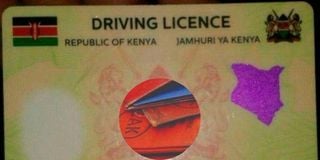Government to phase out old driving licence in three years

The old (inset) and new driving licence.
The government wants all motorists to switch to smart driving licences within three years.
According to new proposed regulations from the National Transport and Safety Authority (NTSA), contained in the National Road Safety Action Plan 2024-2028, the authority says that the move is part of the plan to phase out all old driving licences.
The proposal also wants to introduce demerit points widely used in the West to tame drivers, which will see each motorist’s card loaded with 20 points to be deducted progressively at a rate proportional to the offence committed.
“This is critical to the integrity of road safety in the future and will be accompanied by identity checks to eliminate identity fraud through the licensing system. With every Kenyan driver smart driver licence, it will be possible to administer and implement an instant fine regime and a demerit point system,” the regulations read in part.
The smart licences have instant fines capability software installed, but it will remain inactive until the court case is heard and determined.
“Instant fines are aimed at penalising petty offenders whereby the information will be relayed to our database and fines paid ‘cashlessly’ thereby helping curb graft on our roads,” the new proposal says.
Motorists who commit minor traffic offences such as talking on the phone while driving or exceeding speed limits will pay instant fines of between Sh500 and Sh10,000.
The minor violations included speeding, motorcycle riding without protective gear, failure to fasten seat belts, pedestrians blocking the free passage of cars, driving on footpaths and travelling with part of the body outside a moving vehicle.
Repeat offenders
Repeat offenders who have exhausted their points will permanently lose their licences, have them confiscated temporarily, pay spot fines or attend refresher driving classes.
Breaches like overlapping will see drivers lose a single point from their accounts and get fined.
A driver will have a week or so to recover this “lost” point if he or she doesn’t commit other offences.
Serious offences like drunk driving and speeding will result in deductions of more than 10 points, fines and a raft of other disciplinary measures that could see one lose their licence for life.
NTSA will also share the information on rogue drivers with insurance firms, which could see such drivers’ premiums rise as they will be deemed risky clients.
NTSA estimates that more than 5 million registered drivers in Kenya will be hosted on its digital platform when the government retires the red booklet DL.
According to NTSA Director General George Njao, the system that the authority has adopted in road safety management considers five elements - safe road users, safe vehicles, safe speeds, safe roads, and post-crash care.
“The five elements must integrate, be optimised across, and operate holistically to deal with this safety concern. With a safe system approach, players must not take a silo approach in developing road-safety interventions.
NTSA is pressing for the development of the national speed management policy, the use of cutting-edge technologies in compliance assessment, inter-agency system integrations and stakeholder engagement with parties within the sector,” he says.
Some of the projects in the pipeline relate to implementing the Intelligent Road Transport Management System, installing speed cameras along major corridors, black spot mapping, putting up road signs and piloting the demerit point system to encourage safe and responsible driving.
National speed management policy
NTSA is pressing for the development of the national speed management policy, the use of cutting-edge technologies in compliance assessment, inter-agency system integrations and stakeholder engagement with parties within the sector.
The authority is currently undertaking public participation in the Draft NTSA (Operation of Commercial Service Vehicle) Regulations, 2024, and the Draft Traffic (School Transport) Rules, 2024, as part of its mandate to regulate the transport sector.
The Draft NTSA (Operation of Commercial Service Vehicle) Regulations 2024 aim to regulate all commercial service vehicles with an unladen weight exceeding 348 kilograms.
Similarly, the Draft Traffic (School Transport) Rules 2024 outline regulations for schools to ensure compliance with traffic laws regarding their vehicles.
The authority has notified the public about the intended public participation in Garissa, Meru, Embu, Nairobi, Taita Taveta, Mombasa, Kilifi, Nyeri, Nakuru, Kericho, Kisii, Kisumu, Kakamega and Uasin Gishu counties.
Kenyans are encouraged to submit their comments on both drafts by May 10.
In the Traffic (School Transport) Rules, 2024 draft, school vehicles shall be inspected twice a year and must be fitted with functional safety belts designed to be used by children.
Should the proposed regulations become law, it will be mandatory for drivers to conduct thorough pre-trip and post-trip checks on the vehicle to ensure that the vehicle and safety equipment is operational and that no child is left on board the vehicle.





